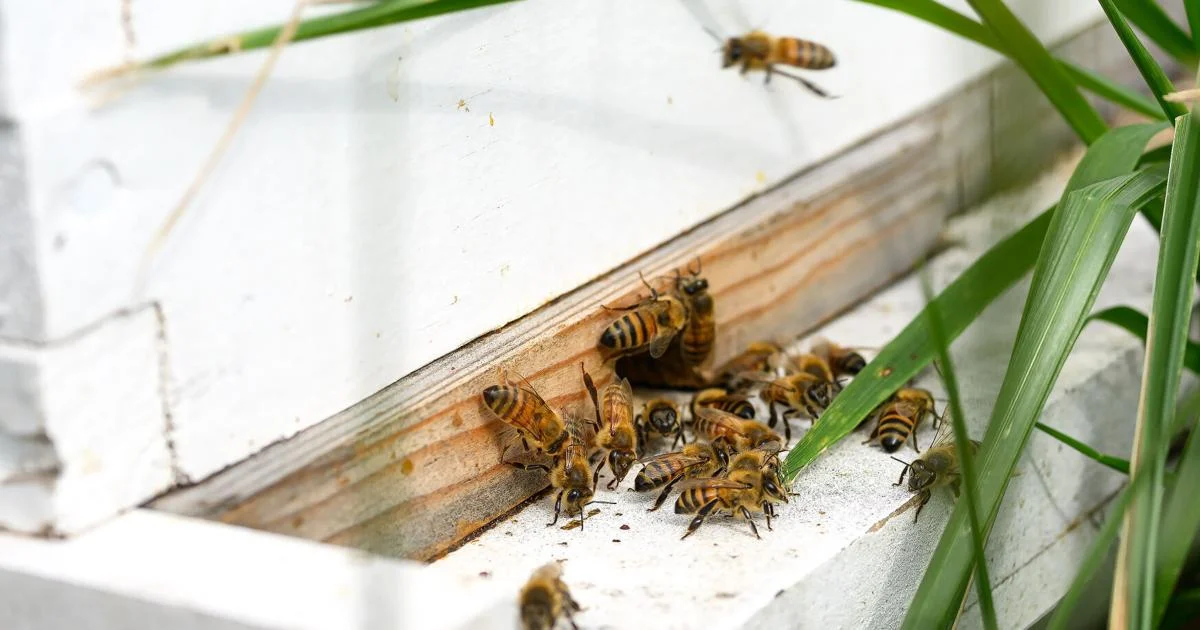
SIOUX CENTER, Iowa — Every day, news releases from public relations firms pop into the newsroom email inbox, their headlines screaming for attention.
One such recent email carried a stinging message, saying 82% of Iowa’s honey bee colonies have vanished.
An attention-grabber, certainly. The study, released by a company selling honey marketed for its hallucinogenic and medicinal qualities, said data is bleak for Iowa and other Midwestern states, and America’s food production could be threatened with fewer pollinators buzzing blossoms.
While it’s true beekeepers have seen increasing colony losses in the past 10-15 years, those headlines might be a little overdramatic, say those who know bees the best.
“Anyone putting the message out there that we’re going to lose our bees is sensationalizing it a little,” said Andy Joseph, Iowa’s state apiarist at the Iowa Department of Agriculture & Land Management. “I don’t think they’ll be going extinct in the near future.”
Duane Bajema, a professor emeritus of agriculture at Dordt University and a longtime beekeeper who’s taught dozens of new beekeepers over the years, agreed the numbers seemed a little high, but there’s truth in them. Losses vary from year to year, but he’s seen up to 70% loss in his own hives. Studies show the death rate continues to increase across the country.
“We are seeing an increase in colony loss,” Bajema said. “The loss, I think, is accurate.”
It sounds bad, and the continuing increase in colony deaths concerns both Bajema and Joseph. But what the headlines don’t say is beekeepers are growing plenty of bees to replace those dying. Beekeepers still are able to buy new bees to replace those they’ve lost, and they continue to split colonies to create new ones.
“Beekeepers can make more bees, and we do. We’re keeping up with it,” said Joseph, a beekeeper himself.
There are many hypotheses about what’s causing significant numbers of bees to die, especially during the winter while huddling in their hives to weather the cold.
“The question is why are colonies becoming more susceptible to environmental conditions that in the past they survived,” Bajema said.
Joseph said in many cases, honey bees aren’t healthy enough to survive. A parasitic mite that targets honey bees and transmits viruses began spreading across the country in the late 1980s, affecting bees’ health and making them more vulnerable to the winter’s cold. The mites are hard to control with pesticides, some of which can put bees at risk. Research continues into ways to fight them.
Honey bee habitat, especially in Midwestern states that have predominantly row crops, Joseph said, has decreased, leaving fewer other plants bees need to remain healthy. Pesticides also could be to blame for vanishing bee colonies.
Bajema cautiously said yes, there are enough honey bees to maintain our food supply. Joseph was a little more emphatic, adding Iowa has adequate pollinator diversity — other bee species, wasps, butterflies — to ensure pollination of the crops that depend on it here.
Each of us can help relieve the stress on our buzzing buddies, too.
Bajema and Joseph both said planting flowers and vegetation, especially varieties native to Iowa, in our yards and gardens provides habitat and nourishment to honey bees and other pollinators. Cut down on pesticide use, especially chemicals that may harm bees. Those dandelions and clovers that many homeowners spray in their yards are great for honey bees, Joseph said, so maybe it’s time to change the idea of the perfect yard.
Buying locally produced honey also helps local beekeepers stay in business and survive the financial hit they take from colony losses. Keeping the people who care for bees in business benefits honey bees.
And take those sensational headlines with a grain of salt — or maybe a spoonful of honey. Though sometimes misleading, they do catch the public’s attention and raise awareness of the need to take care of our bees.
Though bee colony losses are concerning, Joseph doesn’t buy into all the doom and gloom.
“I think we’re going to make it through this,” he said.
That’s a message worthy of some buzz.
Love
0
Funny
0
Wow
0
Sad
0
Angry
0
Be the first to know
Get local news delivered to your inbox!
* I understand and agree that registration on or use of this site constitutes agreement to its user agreement and privacy policy.
Nick Hytrek
Court Reporter
Get email notifications on {{subject}} daily!
Your notification has been saved.
There was a problem saving your notification.
{{description}}
Email notifications are only sent once a day, and only if there are new matching items.
Followed notifications
Please log in to use this feature
Log In
Don’t have an account? Sign Up Today



